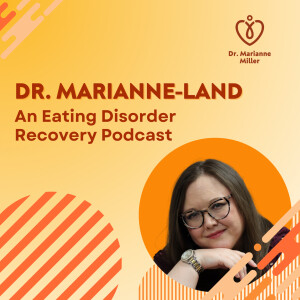

Is ARFID Genetic? What 2025 Research Means for Diagnosis & Treatment
Is ARFID genetic? In this episode of Dr. Marianne-Land: An Eating Disorder Recovery Podcast, Dr. Marianne Miller explores the newest 2025 research on Avoidant/Restrictive Food Intake Disorder (ARFID) and what it means for diagnosis and treatment.
You will hear how twin studies show that ARFID has a strong genetic component, why large projects like EDGI2 and the ARIES study are changing the research landscape, and how updated diagnostic criteria in 2025 are helping clinicians better identify and support people with ARFID. The episode also highlights brain scan findings that explain why food can feel overwhelming, threatening, or unappealing, and treatment studies that show real recovery progress through virtual care and ARFID-specific tools.
Key Findings from ARFID Research-
Genetics play a big role in ARFID but do not determine your destiny
-
2025 research reveals important connections between ARFID, brain differences, gut health, and sensory processing
-
Updated diagnostic criteria are improving accuracy and access to treatment
-
ARFID-specific tools such as the PARDI-AR-Q and EDY-Q provide a more accurate picture of progress
-
Treatment outcomes for children, teens, and adults are encouraging, including in virtual care settings
ARFID is not caused by poor parenting or lack of willpower. It reflects the way a sensitive brain and body respond to the world. With consent-based, sensory-attuned, and neurodivergent-affirming care, meaningful recovery is possible.
Related Podcast Episodes on ARFID- Why Sensory-Attuned Care Matters More Than Exposure in ARFID Treatment on Apple & Spotify.
- ARFID, PDA, and Autonomy: Why Pressure Makes Eating Harder on Apple & Spotify.
- Complexities of Treating ARFID: How a Neurodivergent-Affirming, Sensory-Attuned Approach Works on Apple & Spotify.
- Adult ARFID Explained: Real-Life Strategies for Managing Food & Nutrition with Caroline Holbrook, RD on Apple & Spotify.
If you are ready for practical, step-by-step tools to support ARFID, explore my ARFID and Selective Eating Course at drmariannemiller.com/arfid. This course is designed for families and professionals who want compassionate and effective strategies for ARFID care.
More Episodes
All Episodes>>You may also like
Create Your Podcast In Minutes
- Full-featured podcast site
- Unlimited storage and bandwidth
- Comprehensive podcast stats
- Distribute to Apple Podcasts, Spotify, and more
- Make money with your podcast












